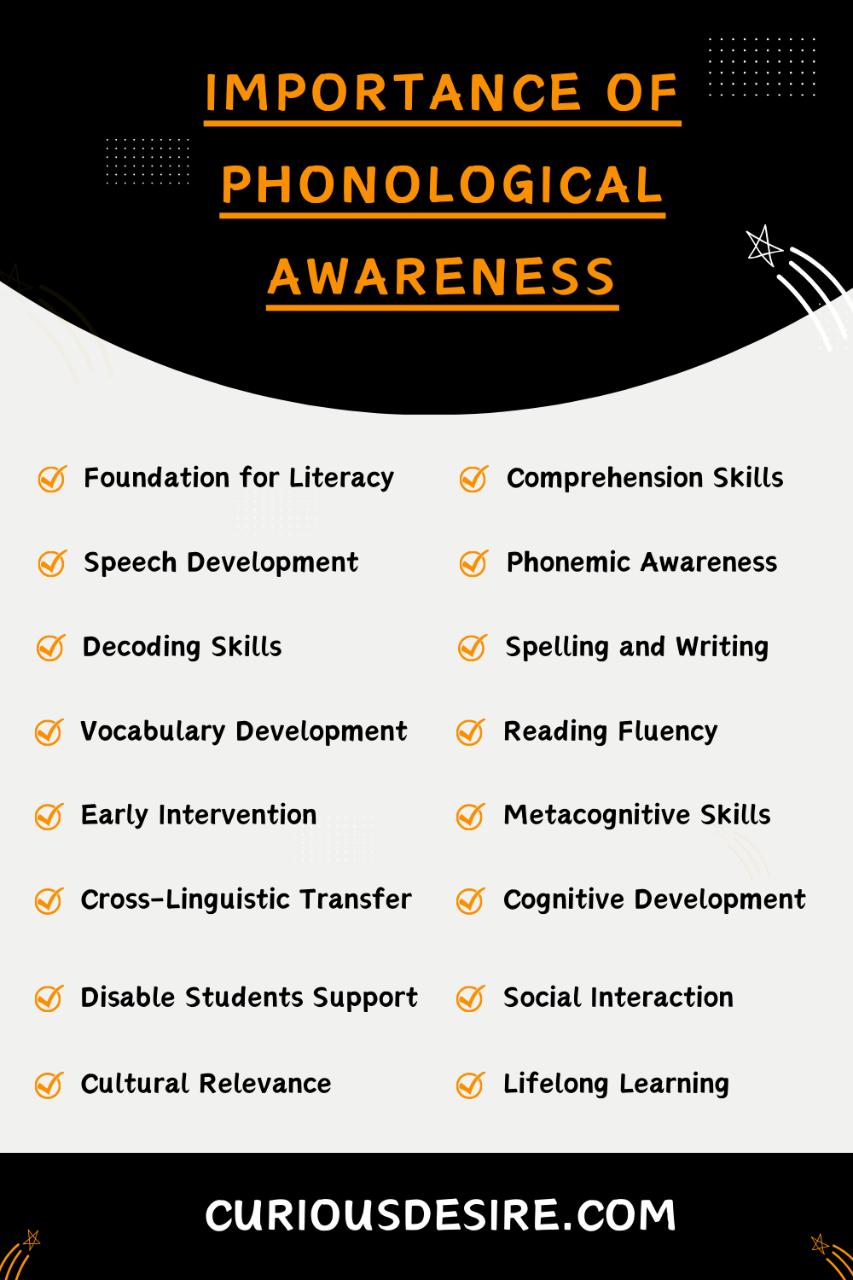Phonological awareness is essential for children’s reading and writing proficiency.
It involves recognizing and manipulating the sounds of language, setting the stage for decoding, spelling, and comprehension.
Let’s take a comprehensive look at the importance of phonological awareness in shaping literacy development and lifelong learning success.
[toc]

1. Foundation for Literacy
Phonological awareness is the bedrock of literacy. It involves recognizing and manipulating the sounds of language, like identifying rhymes or breaking words into syllables.
Without this skill, children may struggle with reading and writing. Let’s suppose, if a child can’t hear the separate sounds in the word “cat,” they might have trouble spelling it or understanding its meaning.
2. Comprehension Skills
Phonological awareness helps children understand spoken and written language better.
When they can recognize and play with sounds, they can understand how words fit together in sentences and what they mean.
This skill also helps them follow stories and understand what they’re reading or listening to, which is important for school and everyday life.
3. Speech Development
Learning about sounds helps children improve how they talk. When they pay attention to sounds in words, they can say them more clearly.
For instance, if children practice saying words like “sun” and “sand,” they might become better at making the “s” sound.
This can make it easier for others to understand them when they speak, which can help them communicate better with friends, family, and teachers.

4. Enhanced Phonemic Awareness
Through Phonological awareness, children learn about the small sounds in words, which is called phonemic awareness.
Understanding these sounds is crucial for reading and spelling.
For example, if a child knows that the word “cat” has three sounds (/k/, /æ/, /t/), they can blend these sounds together to read the word.
Similarly, they can break the word “bug” into its individual sounds (/b/, /ʌ/, /g/) to spell it.
5. Decoding Skills
Phonological awareness aids children in decoding words by breaking them into smaller units, such as syllables or phonemes. This skill is crucial for reading comprehension.
When a child recognizes that “cat” consists of three sounds (/k/-/a/-/t/), they can effortlessly decode and comprehend the word, facilitating their overall reading comprehension skills.
6. Spelling and Writing
Understanding the relationship between sounds and letters aids spelling.
With phonological awareness, children can accurately spell words by matching sounds to letters.
Knowing that “cake” starts with the /k/ sound helps a child spell it correctly.

7. Vocabulary Development
Activities related to phonological awareness, such as rhyming games, play a crucial role in expanding vocabulary.
By engaging in activities that involve playing with sounds, children develop a deeper awareness of language structures and meanings.
For example, when children rhyme words like “cat” and “bat,” they not only enhance their phonological awareness but also learn new words and their associated meanings.
This hands-on approach to language exploration not only makes learning enjoyable but also enriches understanding of vocabulary and linguistic concepts.
8. Reading Fluency
Fluent reading relies on quickly recognizing and processing sounds.
Phonological awareness enhances this skill, enabling children to decode words efficiently and read smoothly.
Therefore, a child with strong phonological awareness can read sentences with ease, as they can quickly identify and blend sounds into words.
9. Early Intervention
Identifying phonological awareness difficulties early allows for timely intervention.
With targeted instruction and support, struggling readers can improve their phonological skills, preventing future reading difficulties.
For instance, a child showing signs of phonological struggles might benefit from individualized activities focused on sound recognition and manipulation.
10. Cross-Linguistic Transfer
Phonological awareness skills transcend language barriers. Developing these skills in one language can aid literacy in another, which is crucial for bilingual or multilingual learners.
For instance, a child who learns to segment sounds in English can apply similar skills when learning to read in another language, like Spanish or Mandarin.
11. Metacognitive Skills
Engaging in phonological awareness activities helps children become aware of their own thinking.
For instance, when they try to rhyme words or break words into syllables, they’re learning to think about how they think.
This helps them become better learners because they can understand their strengths and challenges and figure out how to improve.

12. Support for Students with Learning Disabilities
Children with learning disabilities like dyslexia often struggle with phonological skills.
However, targeted instruction focusing on these skills can help them improve.
A child with dyslexia might benefit from practicing blending and segmenting sounds in words to improve their reading abilities.
13. Cognitive Development
Engaging in phonological awareness activities stimulates children’s thinking skills.
When they categorize words based on their initial sounds or identify rhyming words, they’re using critical thinking and problem-solving.
This helps them become better learners and problem solvers in all areas of life.
14. Social Interaction
Phonological awareness activities often involve working with others, which helps children develop social skills.
When they play rhyming games or sing songs with their peers, they learn to take turns, listen to others, and communicate effectively.
This helps them build positive relationships with classmates and friends.
15. Cultural Relevance
Phonological awareness activities can incorporate rhymes and songs from different cultures, which helps children appreciate diversity.
Learning a traditional nursery rhyme from another culture not only enhances engagement but also teaches children about different languages and customs.
This encourages respect for cultural differences and promotes inclusivity in the classroom.
16. Lifelong Learning
Phonological awareness is not just important for reading and writing in school; it’s a skill that helps people learn throughout their lives.
For example, adults who can recognize and manipulate sounds in language might find it easier to learn new languages or understand complex information.
This skill supports lifelong learning and helps people succeed in many areas, from work to personal interests.
Importance Of Phonological Awareness FAQs
1. What is the importance of phonological awareness in every child’s learning?
Phonological awareness is crucial for every child’s learning as it serves as a foundational skill for reading and writing.
It helps children recognize and manipulate the sounds of language, enabling them to decode words, spell accurately, and comprehend written text.
Without phonological awareness, children may struggle with various aspects of literacy, hindering their academic progress and overall learning development.
2. Why is it important to assess phonological awareness?
Assessing phonological awareness is essential because it provides valuable insights into a child’s literacy development.
By identifying strengths and weaknesses in phonological skills, educators can tailor instruction to meet individual needs, provide targeted interventions for struggling readers, and track progress over time.
Early assessment of phonological awareness can also help identify children at risk for reading difficulties, allowing for timely intervention and support.
3. Why is phonology important in learning?
Phonology is important in learning because it forms the foundation of language acquisition and literacy development.
Phonology refers to the sound system of a language, including the patterns and rules governing how sounds are produced, organized, and used in communication.
Understanding phonology enables children to recognize and produce speech sounds, decode written words, spell accurately, and comprehend written text. Without phonological skills, children may encounter difficulties in reading, writing, and overall language comprehension.
4. What is the most important phonological skill?
While all phonological skills are important, phonemic awareness is often considered the most crucial phonological skill.
Phonemic awareness involves the ability to identify, manipulate, and segment individual phonemes, which are the smallest units of sound in language.
Proficiency in phonemic awareness is essential for successful decoding and spelling, as it enables children to recognize the individual sounds in words and understand how they blend together to form meaningful units of language.
5. What are the key features of phonological awareness?
The key features of phonological awareness include the ability to recognize and manipulate various aspects of sound within language, such as syllables, onset and rhyme, phonemes, and rhyme.
Phonological awareness also involves skills like blending, segmenting, and manipulating sounds in spoken words.
Additionally, phonological awareness activities often require children to discriminate between similar sounds, identify patterns in language, and understand the relationship between sounds and letters.
6. What are the 5 components of phonological awareness?
The five components of phonological awareness are:
- Rhyme Recognition: Identifying words that rhyme or have similar ending sounds.
- Syllable Awareness: Recognizing and counting the syllables in words.
- Onset and Rime Awareness: Recognizing the initial consonant sound (onset) and the remaining vowel and consonant sounds (rime) in words.
- Phoneme Identification: Identifying and categorizing individual sounds (phonemes) in words.
- Phonemic Manipulation: Manipulating and blending or segmenting individual phonemes within words.